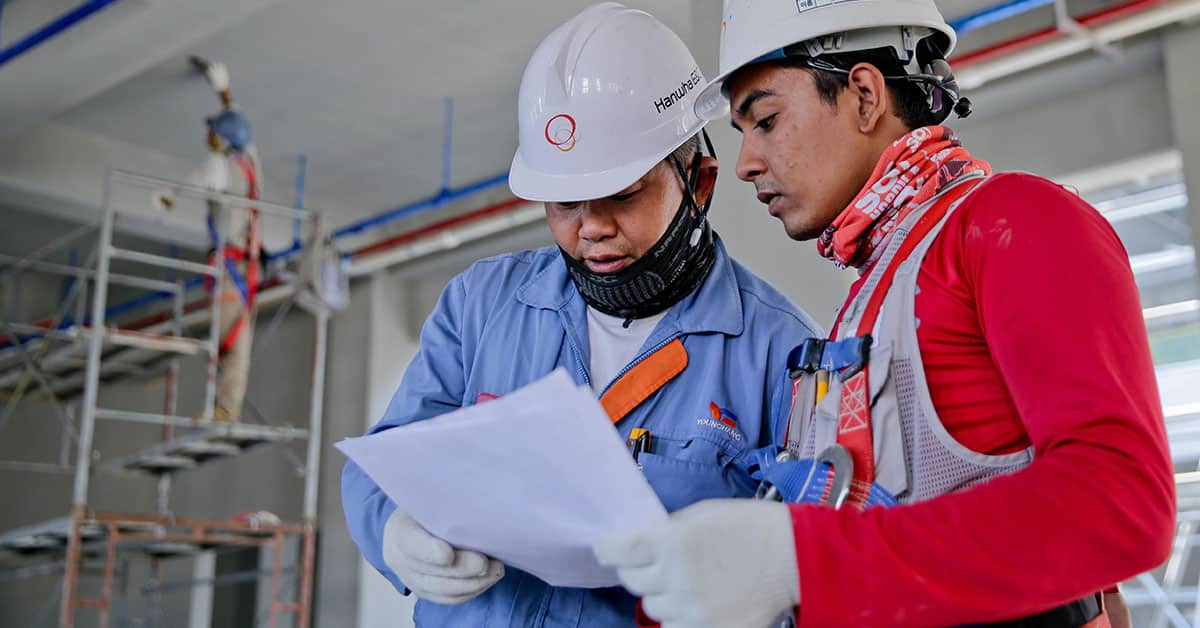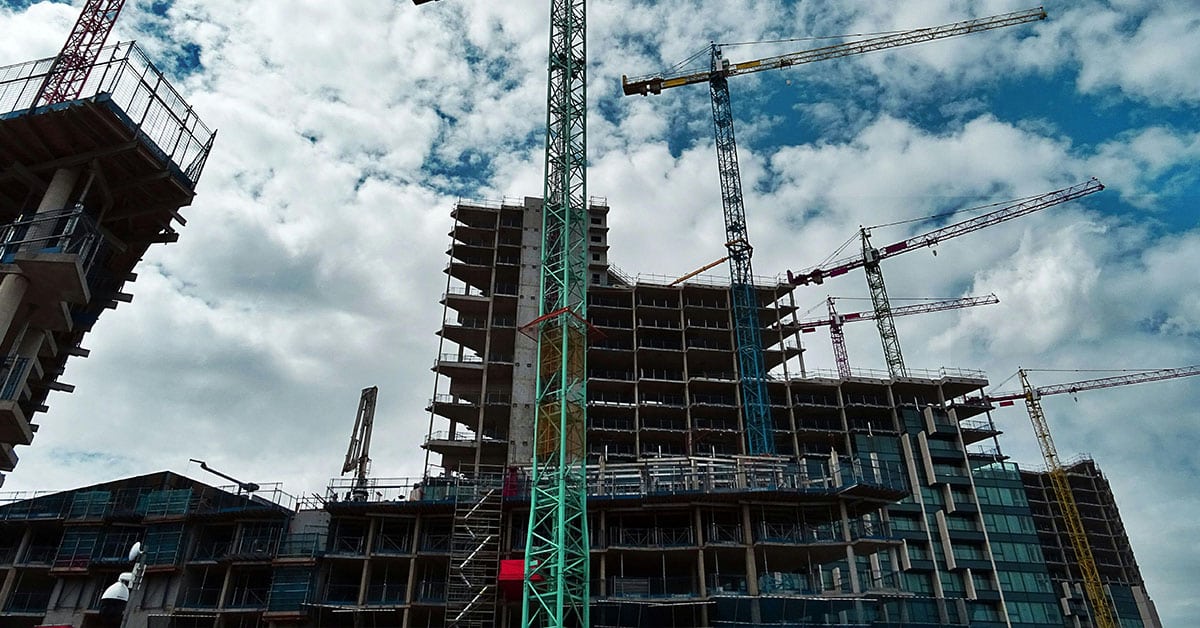Your Guide to Local Permissions, Zoning Laws, and More
If you’re planning a new commercial project in El Paso County, then you’ll need to understand and navigate Colorado Springs building permits before breaking ground. In El Paso County, these approvals determine whether your project is safe, legal, and properly located. While the process can feel overwhelming, understanding how it works (and what the local rules are) will save you time, money, and stress.
At Hammers Construction, we’ve been guiding Colorado business owners through the commercial building, permitting, and zoning process for over 30 years. In this guide, we’ll break down exactly what commercial building permits are, how zoning works in El Paso County, what steps to expect, and how to avoid common roadblocks along the way.
Overview
- What Are Commercial Building Permits?
- Why Colorado Springs Building Permits Matter
- Zoning Laws in El Paso County
- The Permit Application Process
- Common Roadblocks and How to Avoid Them
- Getting Professional Permit and Zoning Help

What Are Commercial Building Permits?
A building permit is official approval from the county or city that allows you to begin construction, expansion, or significant renovation on a commercial property. Permits are tied to urban planning and construction law, and they ensure your project follows local building codes, safety requirements, and land-use regulations.
In El Paso County, a permit is more than just paperwork; it’s the county’s way of making sure your structure is safe, functional, and appropriate for the location. Without one, you risk fines, costly delays, or even demolition of unauthorized construction.
Why Colorado Springs Building Permits Matter
Business owners often ask, “Why do I need a building permit if I own the land?” Here’s why:
- Safety & Compliance: Every commercial building must meet local and national safety standards. Inspectors check compliance throughout the process.
- Financial Protection: Without permits, lenders and insurers may refuse to finance or cover your project.
- Property Value: A properly permitted build holds more long-term value. Unauthorized work can decrease resale potential.
- Business Operations: A project without permits can be shut down mid-construction, leaving your investment at risk.
Permits may feel like red tape, but they protect your business from costly problems down the road.
Critical Zoning Laws in El Paso County
Permits and zoning go hand in hand. Zoning regulations determine how land can be used — for example, whether an area is designated for industrial, retail, office, or mixed-use. You can’t build a nightclub in a quiet residential zone, and you can’t expand a warehouse in an area reserved for community use.
In El Paso County, zoning is defined in the Land Development Code, which sets rules for how each property can be developed. Here’s what business owners need to know:
- Base Zoning Districts: The county divides land into districts (residential, commercial, agricultural, mixed-use, etc.). Each district has rules about what can and can’t be built. For example, RR-5 zoning (Rural Residential) requires a 5-acre minimum lot size per dwelling, while RR-2.5 zoning allows for slightly denser development.
- Dimensional Standards: Every zone comes with specific requirements, such as setbacks (distance from property lines), maximum building height, and lot coverage limits. These rules shape what your building can look like and where it can be placed.
- Accessory & Special Uses: Some uses may be allowed as “accessory” (supporting uses like outbuildings), while others require special approval. In agricultural districts, certain non-public buildings may even be exempt from permits under specific conditions.
- Subdivisions & Easements: If you plan to divide your property, El Paso County defines “minor subdivisions” (four or fewer lots) with a simpler approval process, but you’ll still need to show all easements clearly on your site plan.
- Environmental & Health Considerations: Projects in floodplain overlays, steep slopes, or areas with drainage concerns may face additional requirements. Larger developments may also require reviews from the Environmental Health Division to protect water and air quality.
- Code Updates: El Paso County is in the process of updating its zoning code, which means rules can change. Always confirm the latest version with the Planning & Community Development Department.
Pro Tip: Checking zoning regulations before purchasing land or submitting plans can prevent months of costly redesigns and delays.

The Permit Application Process, Step by Step
The Colorado Springs building permit process typically includes:
- Pre-application research: Verify zoning, land-use regulations, and site-specific restrictions.
- Site plan submission: Detailed drawings showing how the property will be used.
- Plan check (PLCK): The county reviews your project for compliance with codes and ordinances.
- Permit issuance: Once approved, you’ll receive authorization to begin construction.
- Inspections: County officials perform inspections at various stages to ensure compliance.
- Final approval: After a successful final inspection, your building is officially cleared for occupancy.
The timeline can vary. Straightforward projects may move quickly, while complex builds with multiple zoning considerations may take longer.
Common Roadblocks and How to Avoid Them
Even experienced developers run into challenges. The most common issues include:
- Incomplete Applications: Missing documents or site details can stall approval.
- Zoning Conflicts: Trying to push a project in an incompatible zone will almost always lead to rejection.
- Code Updates: Local building codes evolve. Failing to design with updated requirements can mean costly redesigns.
- Permit Delays: Seasonal volume, staffing shortages, or additional agency reviews can slow down timelines.
How to Avoid Them:
- Start with a knowledgeable contractor who understands local regulations.
- Double-check zoning and land-use restrictions before committing to a site.
- Build flexibility into your project timeline.
- Keep open communication with inspectors and county officials throughout.

Trusted, Local Help Through the Colorado Springs Building Permit Process (and More)
For over 30 years, Hammers Construction has been helping business owners in Colorado Springs navigate the commercial building process. As the region’s trusted design-build contractor, we handle every step — from land procurement and planning to construction and final inspection.
- Confidence: 95% closed contract rate.
- Quality & Safety: Decades of experience delivering on time and on budget.
- Skill & Cost Control: Our vertical integration means lower costs and faster project turnaround.
- Proven Reputation: Hundreds of successful builds, trusted by banks, medical practices, manufacturers, and small businesses across El Paso County.
With Hammers Construction, you won’t have to stress about the Colorado Springs building permit process or zoning laws. Our design-build approach means we take care of all the details — from applications and plan checks to zoning compliance. You can stay focused on growing your business, while we make sure your project is done right.
Contact Hammers Construction today to start your project with full confidence and full compliance.
Frequently Asked Questions About the Colorado Springs Building Permit Process
What requires a building permit in Colorado?
In Colorado, a building permit is required for most new construction, expansions, or significant renovations. This includes commercial buildings, tenant improvements, major remodels, structural changes, and additions. Even non-structural work like electrical, plumbing, or mechanical upgrades usually requires a permit. Some small-scale projects (like cosmetic updates or certain agricultural buildings) may be exempt.
Are building permits public record in Colorado?
Yes, Colorado Springs building permits are public record in Colorado. You can search permit history through your local jurisdiction (in El Paso County, that’s the Pikes Peak Regional Building Department).
What happens if I build without a permit in El Paso County?
Unpermitted work can result in fines, stop-work orders, and in some cases, demolition of the unauthorized construction. It can also prevent you from getting a certificate of occupancy, which means your business can’t legally open.
How do zoning laws affect commercial projects?
Zoning laws dictate how land can be used. For example, whether it’s designated for industrial, retail, office, or mixed-use. They also establish rules for setbacks, building height, and lot coverage. If your project doesn’t align with local zoning, you may need a variance or rezoning approval before you can move forward.
What is a design-build contractor?
A design-build contractor manages both the design and construction phases of your project under one contract. This streamlines communication, reduces delays, and helps control costs compared to traditional construction models where design and building are handled separately.
How does Hammers Construction handle permits and zoning?
At Hammers, we take care of the entire permit process for you. Because we’re a true design-build contractor with over 30 years in El Paso County, we already know the local zoning laws and building codes. That means you don’t have to spend hours navigating paperwork or worrying about compliance. We manage it all while keeping your project on time and on budget.



